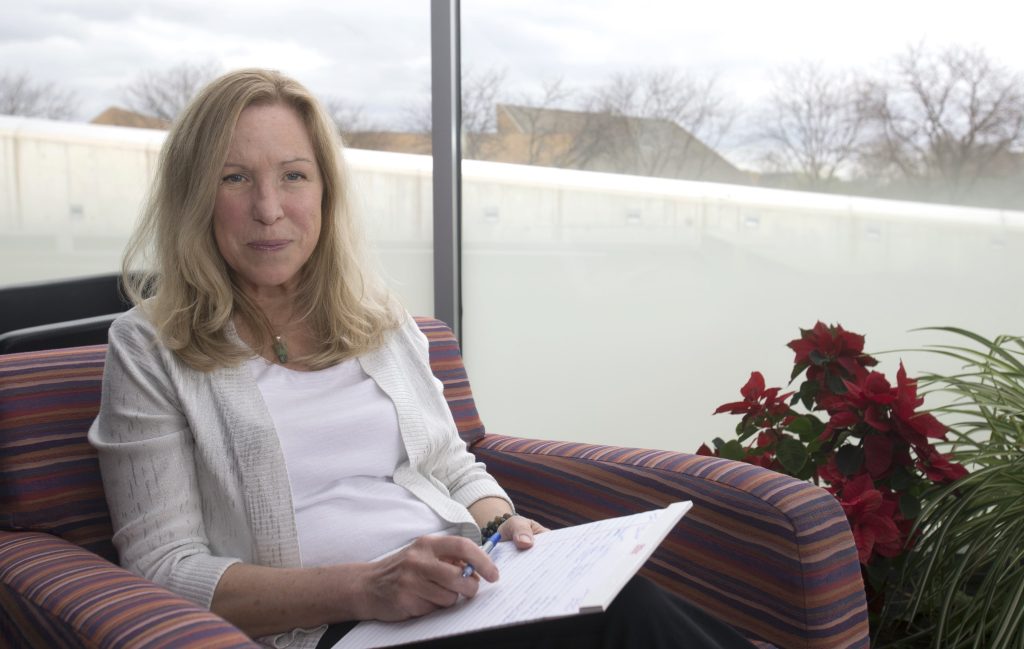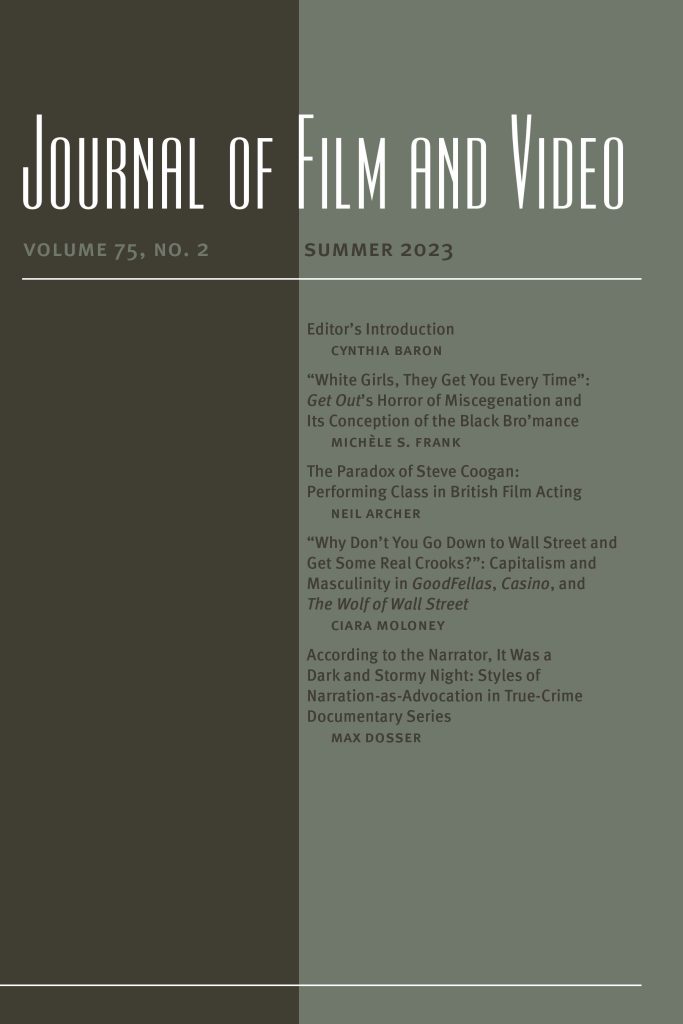The Journal of Film and Video is excited to announce a new editor! The Journal of Film and Video features scholarship on film, video, and media production, history, and aesthetics as well as research on education in these fields and the role of fiction and documentary work in society. The Journal is the official publication of the University Film & Video Association.
Please join us in welcoming Cynthia Baron as the new editor of the Journal of Film and Video. Her term as editor began with the publication of Volume 75, Issue 2 in 2023, available online now.
Cynthia Baron is currently a professor at Bowling Green State University in the Department of Theatre & Film. She got her PhD in Film, Literature, and Culture at University of Southern California. Dr. Baron is the founding editor of The Projector, a peer reviewed journal on film, media, and culture, and the editor of the Palgrave Studies in Screen Industries and Performance series.
She is the author of Modern Acting: The Lost Chapter of American Film and Theatre and Denzel Washington, as well as the co-author of several other books. She has published many articles, including two in Journal of Film and Video:
- “Stanislavsky’s Terms for Script Analysis: Vocabulary for Analyzing Screen Performances”
- “Acting Choices/Filmic Choices: Rethinking Montage and Performance.”
Michael Clarke, Outgoing Editor
Many thanks to outgoing editor Michael Clarke for his work on Journal of Film and Video! Dr. Clarke earned his PhD in Film and Media Studies from the University of California, Los Angeles, and is currently working as a faculty member in the TV, Film, and Media Studies Department at California State University, Los Angeles. He has served as the editor of Journal of Film and Video since 2019 and worked on thirteen issues over five volumes.
Interested in learning more about the Journal’s new editor? Read on for our interview with Dr. Baron below.
Q&A with Cynthia Baron
Q: Can you tell us about yourself, your history with the University Film & Video Association, and with the Journal of Film and Video more specifically?
A: Throughout my career, I have combined (or bounced between) production and studies. As a philosophy major, my thesis was a twenty-minute experimental film. While getting my MA in Film, I did a range of freelance production jobs and worked for a rental house in San Francisco and a production company in Los Angeles. After doing a good deal of script development in Los Angeles, I decided a PhD would allow me to help aspiring screenwriters develop the skills and experience to work in various areas of production. Remarkably, the plan worked; along with teaching a range of film studies courses, I have had the good fortune of regularly working with students in screenwriting courses and workshops.
UFVA has offered a welcoming and productive environment to explore my interests in production and studies. In addition, the organization’s emphasis on pedagogy has been especially helpful in my efforts to foster student participation in campus film programming and to create learning experiences that are pertinent and inclusive. Throughout the years, the Journal of Film and Video has been an excellent resource for personal research projects and even administrative duties that include drafting tenure and promotion rubrics for MFA faculty.
Q: What are your goals as editor of Journal of Film and Video?
A: Any Journal of Film and Video editor has three main objectives.
Making JFV relevant, engaging, and worthwhile for University Film and Video Association members is essential because the Journal is the organization’s official publication. I would like each issue to offer something that contributes to a member’s creative, scholarly, or pedagogical activities.
Fostering trustworthy research in film and media production and studies is a second and closely related goal. Circulating sound, innovative ideas among UFVA members contributes to their careers. In addition, making credible, transferable information and insights available to everyone with digital access to the Journal of Film and Video enhances film and media production and studies, which is an inherently positive effect and a way to augment the reputation of UFVA, the Journal, and its contributors.
A JFV editor must also serve the authors who submit their material to the Journal. It is crucial that an editor recognize their biases and move beyond their personal interests. Because the submitted material often represents work that is in an early stage of development, an editor must not be a punitive gatekeeper who eliminates work that has initial oversights or limitations. Instead, to facilitate the work of scholars and practitioners who are breaking new ground, an editor must locate readers with pertinent expertise and offer additional mentoring recommendations in the review process. The time spent with authors connects to the first two goals in that these author-editor interactions are designed to facilitate publications that benefit UFVA members, the Journal’s wider readership, and the broader field.
Q: Are there any specific topics, methodologies, or qualities you’re looking for in articles to publish in the Journal?
A: To best serve authors, UFVA members, and the field of film and media, it seems best to avoid restrictions on topics or methodologies. Instead, to continue the Journal of Film and Video’s established trajectory, I am looking for scholarship on film, video, and media production, history, and aesthetics as well as research on education in these fields and the role of fiction and documentary work in society.
Authors should recognize that JFV is grounded in humanities research traditions that examine cultural, historical, material, and aesthetic dimensions in ways that differ from specialty journals or publications in communication studies. Authors should also note that JFV generally publishes full-length research articles (25 to 30 pages) rather than short, impressionistic pieces.
I am looking for articles with specific qualities. Readers benefit from research that contextualizes individual productions and the work of creative laborers. They also find value in research that examines case studies from intersectional and interdisciplinary perspectives. Whether readers are in production or studies, they derive applicable knowledge from in-depth research that sheds light on the conception, production, distribution, exhibition, and/or reception of film and media in all its various forms.
Authors must clarify the relevance of their research in the opening pages. The Journal welcomes research on overlooked topics and productions, but it is the author’s job to create ways for readers to connect with material that is new to them. Authors must also have a discernable thesis in the opening pages, and they must say how their work contributes to existing studies, thus answering the “so what” question in the article’s opening pages. Authors should know that submissions can be rejected if they do not conform to the Journal’s style guide, which can be accessed (along with the submission checklist) via the submissions link on the Journal’s website.
I am looking for articles that feature clear, jargon-free, fact-checked, and grammatically correct writing. I strongly recommend that authors work with a professional copy editor before submitting material to the Journal. To facilitate research in production and studies, I am also looking for work that avoids sweeping, irrelevant, and unsupported generalizations and, instead, offers evidence to illustrate key observations. In sum, authors must strive to communicate effectively and create articles that are engaging and worthwhile for readers.
Q: What advice would you give to authors just beginning to research in the film and media studies field?
A: It is useful to have an open mind and to see the artistic and social significance of film and media productions from different eras, regions, and cultural-aesthetic traditions. One should develop an awareness of and respect for film and media productions’ myriad textual components, which include sound design, costuming, color design, framing choices, choreography of performance, and so on. Equally important, it is wise to learn as much as possible about off-screen forces that shape what finally appears in a production and how gatekeepers frame conversations about it. Production and reception factors range from naturalized self-censorship practices to macro socioeconomic realities.
It is useful for everyone to do conference presentations. These occasions prompt a person to write in ways that are intelligible to other people. The time delimitation, generally twenty minutes, also provides experience whittling down a topic to an idea that a person can clarify and illustrate in the time allowed.
I also recommend reflecting on the writing and research approach in the books and articles that are both accessible and illuminating to you. This material can serve as models for your own work as you embark on the career-long endeavor to communicate effectively and do research that matters.
Q: Which areas of film and media studies have been growing? Which need more attention?
A: Scholars are always working to keep up with artists and the entertainment industry. As a result, emerging areas of research and ones requiring more attention generally overlap. Research that contextualizes current developments in film and media is especially useful insofar as it both calls attention to telling changes that might have received little attention and clarifies how those changes fit into evolving patterns in style, technology, and/or industrial configurations. Here again, the key is evidence-based research that is attentive to textual operations, material factors, and questions of cultural specificity.
Q: Is there anything else you would like readers or contributors of Journal of Film and Video to know about you?
A: In closing, I might mention that I approach the professional service of being the JFV editor as an author who knows what it feels like to have work critiqued by colleagues. Over time, I have learned to sidestep that initial fight-or-flight response because it has become so clear that the work always gets better as I address the comments. I’m also someone who has had their material reviewed by copy editors, the unsung guardian angels of all authors. Despite one or two unhelpful encounters, my experience is that copy editors are invaluable because they are experts in written communication and have sufficient distance to identify what does not make sense to a reader. These experiences as a peer-reviewed author have given me a profound respect for the process and for writing itself.
Find Out More
- Individual subscriptions can be made through the University of Illinois Press website.
- To recommend this title to your library, fill out this Library Request Form and provide to your library via email or in person. Many institutional libraries also have an online form you can fill out on their websites.
- Ready to see your work featured in Journal of Film and Video? Submit original scholarly work here.


